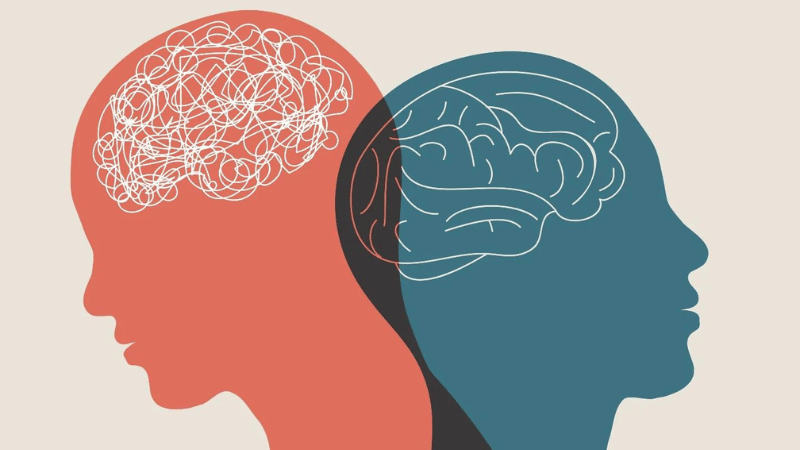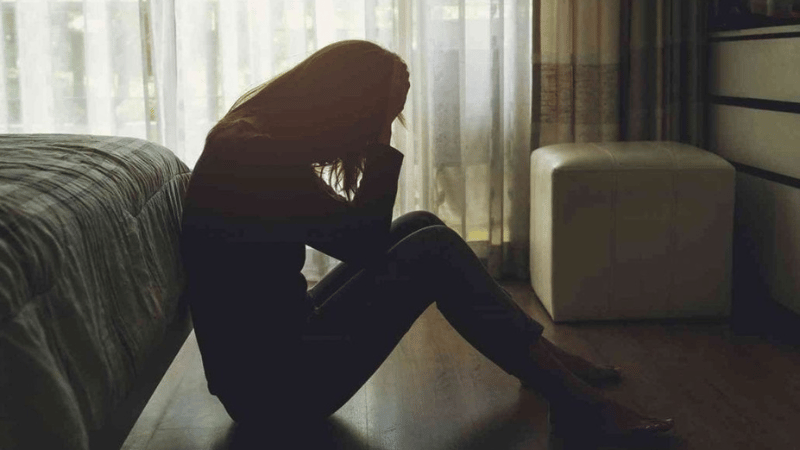
Fibroids can affect various aspects of your mental health and overall wellness, from simply adding more stress to your life to exacerbating symptoms caused by clinical depression. Mental health, characterized by an individual’s ability to cope and manage life’s typical stressors effectively, is closely intertwined with physical health. For example, women with uterine fibroids are more likely to experience depression and anxiety at higher rates than women without fibroids.¹
Although fibroids can exacerbate mood disturbances, they do not necessarily lead to clinical depression or anxiety disorders. There can be an overlap in symptoms, but the difference lies in the severity, duration, and impairment in functioning. Conditions such as clinical depression and anxiety disorders involve persistent and pervasive patterns of symptoms significantly interfering with daily life, relationships, and work. It’s not a temporary feeling that will disappear but conditions often requiring professional intervention and treatment.
For treating clinical depression or anxiety disorders, work with a therapist or psychiatrist who can work with you to determine how to best manage your symptoms. If you also think you have fibroids, consult a medical professional about the best treatment for you, especially if it’s severely impacting your mental health. It’s essential to differentiate between feeling low because of fibroids and experiencing clinical depression. While fibroids can affect your mental health, they don’t necessarily lead to clinical depression.
Symptoms of Fibroids
Fibroids can significantly impact mental health and well-being to varying degrees. Understanding the relationship between fibroids and mental health involves recognizing how physical symptoms can affect emotional and psychological states. For many individuals, the stress caused by fibroid symptoms can lead them to feel overwhelmed and discouraged, emphasizing the need for timely diagnosis and management.
You may have fibroids if you experience a combination of the following symptoms:
- Heavy bleeding
- Frequent urination
- Pain during sex
- Bloating
Some women who have fibroids may only experience mild symptoms. However, many women experience symptoms severe enough to impact their day-to-day lives. The severity of this impact can negatively affect their mental health, magnifying feelings of anxiety and depression.
Fibroids and Depression
There is a strong connection between uterine fibroids and depression because of their effect on the Hypothalamic-Pituitary-Ardenal axis (HPA).
The HPA regulates the body’s response to stress and emotions. When the HPA doesn’t function properly, it intensifies stress responses, affecting your mood and possibly leading to depression. Hormonal changes associated with depression, particularly elevated progesterone levels, can also impact the growth of fibroids.
Can Fibroids Cause Depression?
Feeling frustrated, irritable, and sad from disruptive symptoms is a natural response to dealing with a health condition affecting your life. When it comes to uterine fibroids and depression, it is not a case of one condition causing the other. Instead, the relationship between uterine fibroids and depression is more about how these conditions exacerbate the negative symptoms of each other.
Fibroids’ painful and uncomfortable physical symptoms can cause symptoms associated with depression, including:
- Restlessness
- Inability to enjoy interests
- Sleep disturbances
- Lack of concentration
Conversely, the emotional strain caused by depression may contribute to hormonal imbalances, potentially influencing fibroid development and growth.
Menopause and perimenopause, times of significant hormonal fluctuations, can also contribute to depression. Although it is common for fibroids to shrink during menopause because of the hormonal decline, the unpredictable hormone changes and menopausal symptoms can affect the emotional well-being of women with fibroids.
Fibroids and Anxiety
The connection between fibroids and anxiety encompasses both fibroid’s physical symptoms and their associated emotional challenges.
Symptoms such as prolonged bleeding, pelvic pain, and back pain can cause anxiety, especially if it’s more severe. Fibroids also affect intimate relationships because women with fibroids may experience pain during sex. Many women express feeling anxious due to the perceived lack of control over their bodies.
Can Fibroids Cause Anxiety?
Anxiety concerning fibroids can delay receiving a diagnosis, as women may normalize their experiences or fear the outcomes of medical intervention.
Uterine fibroids can lead to anxious thoughts related to treatment and dealing with symptoms. Women may also harbor anxieties about future health concerns and the associated risks, like potential surgical mistakes and the possibility of infertility.
Acknowledging the emotional burden of fibroids is essential for your well-being, empowering you to control your body and health. Receiving an early diagnosis and breaking the stigma around women’s health issues is instrumental in alleviating fibroid-related anxiety.
SIGN UP FOR OUR NEWSLETTER TO LEARN MORE
Other Ways Fibroids Affect Mental Health

Fibroids and their accompanying symptoms can negatively affect women’s overall well-being, especially if they have not received a diagnosis.² Along with increased stress levels, fibroids are also linked to emotional health issues such as mood swings.
Fibroids and Stress
Although there isn’t a definite conclusion as to whether fibroids cause stress, there is a clear relationship between them.
When women experience higher levels of stress, it can lead to symptom flare-ups. Chronic stress compounds with hormonal disruptions may advance the growth of fibroids.
Stress suppresses the hypothalamus, which controls glands regulating hormones related to the female reproductive system. This suppression can impact the menstrual cycle, possibly causing irregular periods.
Fibroids and Mood Swings
Fibroids not only have a connection to your stress levels, but they also can impact mood swings. These mood swings result from hormonal fluctuations of estrogen and testosterone during fibroid growth.
The challenge lies in distinguishing fibroid symptoms from regular PMS symptoms since there is overlap. If symptoms are severe enough that you are unable to go about your daily life, consider consulting a professional about whether you have fibroids.
FIND A FIBROID CENTER NEAR YOU
Managing Fibroids and Your Mental Health
Therapy is crucial in supporting women’s emotional and mental well-being throughout their fibroid journey. If you want to work with a therapist, seek a professional who specializes in women’s health and reproductive issues for better support in managing the emotional aspects of your fibroid experience. Support groups are also available at some health clinics for women with fibroids.
Along with therapy, other ways you can manage your fibroids and mental health are:
- Exercising daily
- Healthy eating (avoid foods likely to cause fibroid inflammation)
- Maintaining a regular sleep schedule
Keeping your body healthy makes it easier to manage fibroids, as it can prevent fibroid inflammation that can worsen symptoms.
Fibroid Treatment
One of the best ways to manage your fibroids and mental health is to seek treatment with a fibroid specialist. Treating your fibroids allows you to enjoy and live without worrying about how your fibroid symptoms may disrupt your day.
There are different options for treating your fibroids, including:
- Hysterectomy
- Myomectomy
- Uterine Fibroid Ablation (Acessa Procedure)
- Medications
- Uterine Fibroid Embolization (UFE)
UFE, or uterine artery embolization (UAE), is an outpatient procedure offering an effective and affordable alternative to more invasive treatments such as hysterectomies or myomectomies. Hysterectomies can take a mental and emotional toll on women due to it being a major surgery and its impact after removing the ovaries.³ With myomectomies, studies show that women face more anxiety pre-operation than women receiving UFE.4
Our doctors at USA Fibroid Centers can guide you through UFE and answer any questions about the procedure.
Get Started with Treating Your Fibroids Today
At USA Fibroid Centers, our trusted doctors support you through fibroids’ physical and mental effects during treatment. With over 160 center locations nationwide, finding a local center near you is easy.
If you are struggling with fibroids, call 855.615.2555 or use the link below to schedule your consultation today.
Sources
- Stephanie E Chiuve et al., “Uterine Fibroids and Incidence of Depression, Anxiety and Self-Directed Violence: A Cohort Study,” Journal of Epidemiology and Community Health, January 2022.
- Erica E Marsh et al., “Burden, Prevalence, and Treatment of Uterine Fibroids: A Survey of U.S. Women | Journal of Women’s Health,” Journal of Women’s Health, November 2, 2018.
- Chiuve et al., “Uterine Fibroids and Incidence of Depression, Anxiety and Self-Directed Violence: A Cohort Study.”
- Masoumeh Nazarinasab et al., “Comparison of Anxiety Level in Patients under Uterine Fibroid Treatment by Myomectomy and Uterine Artery Embolization (UAE) and Its Relationship with Pain and Duration of Postoperative Hospitalization in Ahvaz Educational Hospitals in 2018,” Journal of Family Medicine and Primary Care, December 27, 2021.



